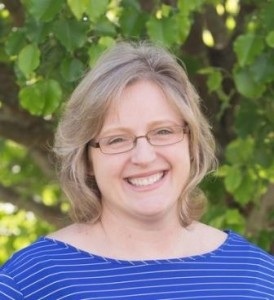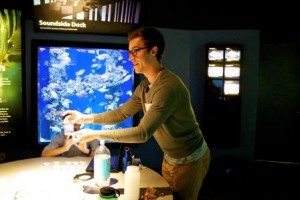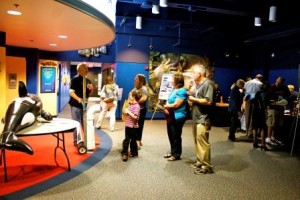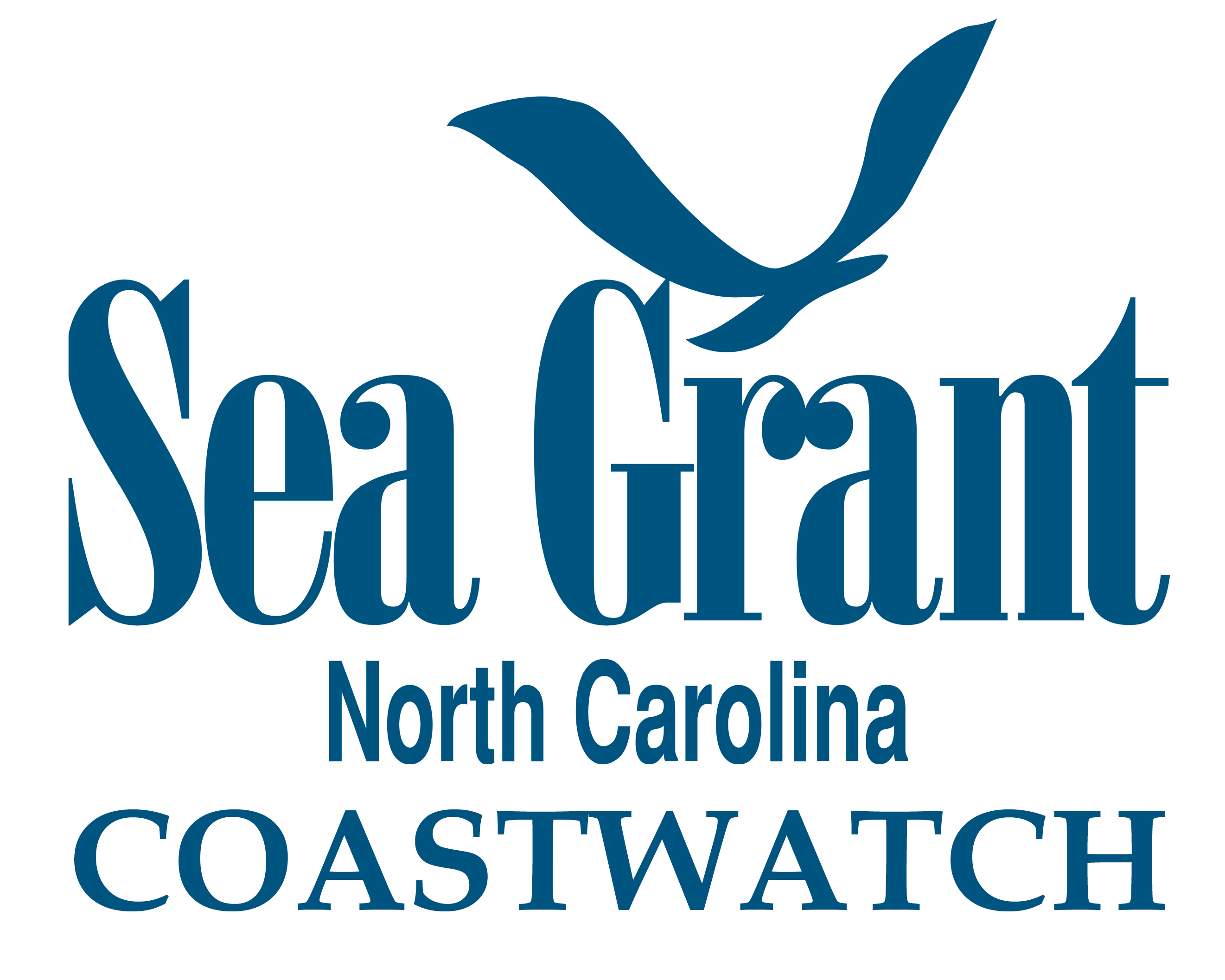By ETHAN THEUERKAUF
“It was pure synergy.”
This is how elementary-school teacher Kelly Riley describes her interaction with a scientist at the 2014 Scientific Research and Education Network, or SciREN, workshop that connected researchers and K-12 educators.
“One of my favorite memories from the event was discussing with a graduate student ideas about how a high-school lesson plan could be adapted to lower grades. We wrote a whole new version of the lesson plan right on the spot,” Riley recalls from the February event at the N.C. Aquarium at Pine Knoll Shores.

Kelly Riley. Photo courtesy Kelly Riley.
“The most important outcome of the night was the following week when my students completed the activities. The learning and connections made were so exciting,” notes Riley, who teaches at the Tiller School, a charter elementary school in Carteret County.
Scientists also benefit from the SciREN workshops and continued communication with K-12 educators. Conducting research is an important component of research grants and institutional mission statements, often an aspect that is unfamiliar to many researchers.
SciREN allows scientists to share the results of their work with a broad audience. Their research is communicated to K-12 educators and, ultimately, to their students. Sustained collaboration with educators after the workshop can lead to more effective delivery of the research to the community.
“It was one of the first times I was speaking about my research to a general audience,” says Shannon Brown, a North Carolina State University graduate student who is a 2014 North Carolina Sea Grant/N.C. Coastal Reserve and National Estuarine Research Reserve fellow.
“The educators seemed to find my work interesting, and many offered suggestions for future improvements or potential colloborations for future work,” she adds. “In addition to feedback from educators, I was able to connect with other graduate students, providing me with the opportunity to collaborate on other research and outreach projects.”
The next step is to broaden the scope of SciREN beyond marine science to include other STEM — science, technology, engineering and math — research, and more scientists and educators.
Enter SciREN Triangle. Scheduled for Nov. 13, 2014, at the North Carolina Museum of Natural Sciences in Raleigh, this will be the workshop’s first foray inland.
This event will include dozens of researchers from the University of North Carolina at Chapel Hill, Duke University and NC State, along with many environmental educators from state, national and nonprofit organizations. Disciplines showcased at the event will range from neuroscience and physics to coastal geomorphology.
“The museum is delighted to partner with SciREN to foster energizing collaborations between scientists, teachers, students and the general public,” notes Megan Chesser, the museum’s curator of teacher education.
“Bringing current scientific research into classrooms is a goal shared by both the museum and SciREN. We hope that the interactions made possible by this partnership will inspire positive changes in North Carolina’s educational landscape, ensuring that learning and teaching remain relevant and exciting both today and into the future.”
SciREN was born in a REEF workshop co-sponsored by the Center for Ocean Sciences Education Excellence-SouthEast, also known as COSEE-SE, through a grant from the National Science Foundation. REEF — the Research Educator Exchange Forum — trained scientists to communicate their research to general audiences. Participants, mostly early-career scientists, collaborated with educators to present an outreach program at an informal science center.
Justin Ridge, a fellow doctoral candidate in marine sciences at the UNC-CH Institute of Marine Sciences, and I attended REEF. As children of teachers, we were aware of the need for classroom resources that can assist teachers who must teach to state and federally mandated educational standards with limited time and financial resources. We realized that the research conducted by scientists here in North Carolina can provide a creative and innovative backdrop for teaching topics required by educational standards.

At SciREN, scientists present hands-on activities to educators. Photo by Emily Woodward.
“There seemed to be a communication gap between teachers and scientists in North Carolina,” says SciREN co-founder Ridge, another 2014 Sea Grant/Reserve fellow. “Scientists do not realize that teachers are keen to bring current research into the classroom to help teach their curriculum, and teachers are not aware that scientists are equally excited about bringing their research into K-12 classrooms.”
Many scientists are conducting research right here in North Carolina, which makes their work perfect for augmenting science education in local schools. The students are intimately aware of their natural surroundings and can use this knowledge, along with the scientist’s research, to learn required concepts and curriculum.
“Using current research and actual data — not something just created to use as an example — makes studying science more real for students. And it can teach them something about their own backyard,” says Terri Kirby Hathaway, Sea Grant marine education specialist, who helped lead REEF and participated in SciREN in 2013 and 2014.
• MEETING OF MINDS
Ridge and I decided to bring marine scientists together with K-12 educators to share lesson plans that the scientists had developed. These resources adhered to educational standards so they were classroom ready and were based on the researchers’ own work. The lessons either use equipment and supplies that already are in classrooms or provide all necessary materials.
The first SciREN workshop, held in spring 2013, was funded by Sea Grant, COSEE-SE and IMS. More than 30 scientists and 65 teachers participated. Scientists stationed at booths throughout the Pine Knoll Shores aquarium displayed their lesson plans and/or demonstrated an activity. Educators could stop to hear about a lesson plan, receive the materials or exchange contact information for future classroom visits.
“The opportunity for classroom teachers to meet face-to-face with graduate students and learn about their areas of research and how it translates to the education world provides real-time, real-life science-learning experiences for our K-12 students. Those face-to-face conversations are so powerful because you see and hear the passion for science and quality science teaching,” Riley explains.
One of the most exciting aspects of SciREN is that communication continues after the workshops. In addition to the lesson plans, teachers find scientists who are willing to come to their classrooms. These in-class interactions not only help students to learn about the cutting-edge science that is conducted in their backyard, but also allows them to find out what it is like to be a scientist, which may inspire some students to pursue STEM careers.

During the two-hour event in February 2014, educators viewed displays and talked with researchers. Photo by Emily Woodward.
“When we visited the Tiller School, the students were so excited to participate in a hands-on activity and quickly learned about food webs and the variety of organisms that live in their backyard. It was great to see them get just as excited about the periwinkle snails as the sharks,” says Michelle Brodeur, a graduate student at IMS and a former Sea Grant/Reserve fellow.
The second SciREN event, also at the aquarium, featured an expanded program with new scientists and lessons. It was led by an extended leadership team that included Heather Heenehan and Alyse Larkin from Duke’s Marine Laboratory, and Avery Paxton from IMS. Almost 100 teachers attended this event, which featured more than 60 scientists from a wide range of scientific institutions, including Duke, UNC, NC State, East Carolina University, UNC-Wilmington, Sea Grant and the Reserve.
“It was terrific seeing previous presenters and getting the chance to discuss the successes of using their resources, as well as talking about new ideas,” Riley notes. She attended both events and values the opportunities to reunite and network.
We hosted a lesson-planning session prior to the main SciREN workshop. A panel of teachers and curriculum-development experts guided the scientists to develop high-quality, classroom-ready lesson plans. Teachers showed scientists the most effective ways to engage students in their lessons, as well as what types of activities and resources work best in the classroom.
“I found the lesson-plan workshop helped me focus in on what the teachers wanted and needed, and also allowed me to work with other students to outline my lesson. It is essential that we get feedback and work with teachers so that we can prepare materials that they can use in their already tight schedules,” says NC State’s Brown.
Starting with Raleigh in November, the SciREN network aims to expand to new regions, while continuing to foster long-term communication and collaboration among its current network of educators and scientists.
Subsequent events must include new scientists and fresh lessons so that teachers have an incentive to attend each year. Fortunately, there is a constant flow of new researchers and projects at the many research institutions and universities in North Carolina. Thus, there is a plethora of fresh material to share with educators. Today’s youth will need to be science literate to tackle complex issues in the future, such as climate change, renewable energy and food security. SciREN enables scientists and educators to collaborate to improve science literacy by inspiring a new generation of students who are informed and passionate about science.
To register for SciREN Triangle, go to www.thesciren.org. For updates on SciREN scientists and educators, follow them on Twitter at @SciREN_OUTREACH or like the network on Facebook by searching for The Scientific Research and Education Network.
This article was published in the Autumn 2014 issue of Coastwatch.
For contact information and reprint requests, visit ncseagrant.ncsu.edu/coastwatch/contact/.
